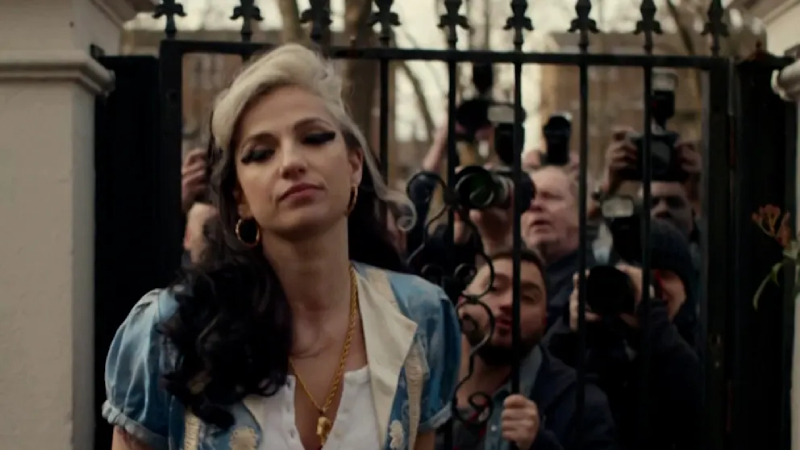




It is extremely easy and also extremely hard to make a biopic of Amy Winehouse. Hard because this is such a responsibility: the late singer authored one of the best selling albums in history (the titular Back to Black), and she ranked 26 in VH1’s prestigious 100 Greatest Women in Music list. Easy because Amy’s short career boasts a number of easily recognisable tunes that will get audiences hooked even if the film execution was extremely poor, plus her extremely turbulent lifestyle and morbid media coverage provide just the right ingredients for the perfect sob story. Back to Black elicits tears throughout, even if storytelling isn’t entirely convincing.
Newcomer Maris Abela plays Amy from adolescence until her tragically predictable and precocious death at the age of 27, in 2011. The movie is a love letter to a young woman horribly trapped in a juvenile romance, and also to Camden, the London borough where she started her career, lived, died and to which she dedicated her most important Grammy Award. This is also where she was commonly found intoxicating herself and precariously staggering home on her pumps while harassed by a swarm of scandal-thirsty paparazzi. Her regular joints The Dublin Castle (where she performed some of the first gigs) and The Good Mixer (where she met her coke-addicted hubby Blake Fielder-Civil, played here by Jack O’Connell) are prominently featured throughout the movie. Conspicuous in its absence, however, is Amy’s favourite pub, the Hawley Arms, which nearly burned down during the fire that devastated Camden Market in 2008 (Amy used her Grammy win in order to express her love for the area: “‘This is for Camden, Camden Town ain’t burning down”, a reference that becomes watered down and decontextualised in the film).
Amy was a headstrong, perhaps even obstinate, young woman. She did not follow anyone’s advice and recorded her music at her own accord, and opted to have her father Mitch (Eddie Marsan) as her manager (to the dismay of the more established agents and impresarios). And she became completely obsessed with Blake, a rowdy young man with little stability to offer her. He becomes the source of inspiration for her most famous album (she only recorded two in her brief life, the debut Frank and the iconic Back to Black), as Amy desperately grappled with unrequited love and rejection (“you go back to her and I go back to black” refers to Blake returning to his previous girlfriend Becky). He eventually go back to Amy, presumably lured by the money and fame, but ends up going to prison after becoming involved in a violent altercation. But not before they both could overcome their drug differences (Amy liked marijuana, while Blake preferred cocaine; the song lyrics so “You love blow and I love puff”) by bonding over the far more destructive class-a heroin.

Despite Amy’s self-determined attitude, she was never a feminist, and neither is Sam Taylor-Johnson’s film. Instead, this is a movie about a troubled young woman desperately seeking solace in music, and creating history-defining pieces that would move people of all ages, ages and nationalities. She is frail, she is dysfunctional and she is incoherent. It is impossible not to love and feel sorry for her as she begins her descent and inevitable demise. This predicament is vaguely relatable to the director’s. Fifty-seven-year-old London filmmaker Sam Taylor-Johnson had to face her own physical vulnerabilities as she struggled with cancer twice, plus she understands what it means to ruffle some feathers with a partner choice: Taylor-Johnson is married to Aaron, an actor 27 years her junior.
Abela does a very good job portraying a woman stuck between fame and juvenile love, and lapsing into drug abuse. She does not look a lot like Winehouse, and is a little less less broken and bawdy. Still, her song renditions are very convincing (even if she is ghost-singed by Amy and presumably others), and her fragile resilience entirely palpable. Marsan paints an affable and avuncular Mitch, who’s terribly proud and protective of his daughter (even is he doesn’t always prioritise her well-being above her career). It feels a little cliched, not least because his parental demeanour is broadly seen is unethical and exploitative. It feels almost like the film wishes to exonerate him. Jack O’Connell is seductive and energetic, however a questionable casting choice. He has the mainstream heartthrob looks, far removed from the Peter Doherty-ish, heroin-chic, fedora-hat-clad real Blake.
The highlight of the film are the songs (Back to Black, Fuck Me Pumps, Valerie and Love is a Losing Game are played almost in their entirety), each one structured as a mini video journeying the most recent events in Amy’s life. Otherwise the story is clumsy and all over the place, much like our rogue heroine. Chronologically structured, Back to Black has huge gaps and fails to provide a coherent account of Amy’s rise and fall. There is very little insight into how Back to Black was recorded, what happened in rehab, how her experiences on St. Lucia helped to pave the way to her death (this is where she replaced heroin with alcohol, which eventually claimed her life), etc. Aesthetically, the movie lacks a certain je-ne-sais-quoi. In other others, it does not possess poetic freedom and narrative inventiveness. It is a movie just too conventional for a woman that refused to play by the rules.
Another problem is the superficial representation of drug abuse. Heroin addiction has devastating consequences. See Christianne F (Uli Edel, 1981) for a realistic portrayal of smack use, with genuinely harrowing cold turkey scene. Taylor-Johnson made the facile decision to make this an easily digestible, feel-good mainstream drama, thereby sanitising a genuinely horrific experience.
Still, bring your hankies: you too will bask in the colourful memories and heart-wrenching warble of this bigger-than-life singer gone too soon!
Back to Black is in cinemas everywhere on Friday, April 12th.











